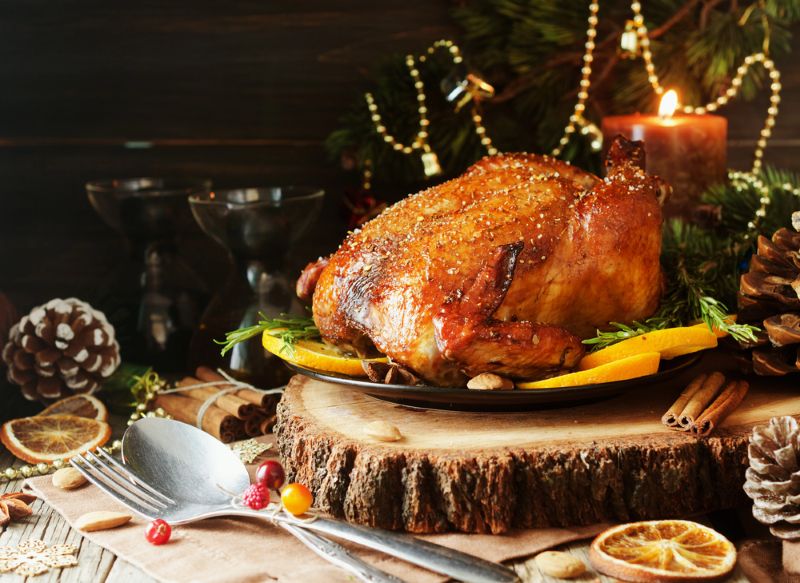The holiday season is a time for celebration and sharing food with friends and family. However, for those living with irritable bowel syndrome (IBS), it can be a source of stress and anxiety. The rich foods, social gatherings and disrupted routines can exacerbate symptoms and make it difficult to enjoy the festivities. But fear not! With a little preparation and a positive mindset, you can navigate the holidays with ease and maintain your gut health. So, read on for my IBS Festive Survival Guide.
How to prepare for holiday meals
One of the biggest challenges for those with IBS during the holiday period is managing mealtimes. You can still enjoy a family gathering or a work party, but a little preparation will ease any anxiety, so plan ahead:
- Communicate your needs: Don’t hesitate to inform your host about your dietary restrictions. A simple explanation like, “I’m following a low FODMAP diet to manage my IBS” can go a long way
- Offer to bring a dish: This will allow you to control the ingredients and ensure a safe food option for yourself
- Scan the buffet: When faced with a buffet, choose meat like turkey, chicken or ham, or vegetable sides without heavy sauces and foods with easily identifiable ingredients and compatible with your low FODMAP diet
- Pack your own snacks: Bring along FODMAP-friendly snacks like wheat free crackers or bread or even some vegetable sticks, such as carrot, cucumber or tomatoes to tide you over if needed
- Eating out: If possible ring ahead and explain that you’re following a special diet ‘for medical purposes’. Briefly explain that your meal should not contain wheat, lactose or onion and garlic (this might be the best you can do in a social situation). Most restaurants are only too happy to help, as long as you give them notice
Navigating tricky social situations
Social situations can be tricky when you have dietary restrictions. Here are some tips to help you navigate these challenges:
- Be assertive: Politely decline unwanted food offers by saying, “I’m sticking to what works best for me” or “I’ll pass, thank you”
- Change the subject: Redirect the conversation to other topics or engage in non-food activities to take the focus off your plate
- Practice mindful eating: Slow down, chew thoroughly and savour each bite. This can help prevent overeating and reduce digestive discomfort
Finding the balance
Whilst it’s important to be mindful of your diet, it’s also okay to have the occasional holiday treat. However, many festive dishes can be adapted to be low FODMAP (see my adaptation of a traditional Christmas Roast Dinner), allowing you to enjoy the flavours of the season without compromising your gut health. See my other festive treats for ideas to spice up your festive season.
Managing stress and tricky times
IBS symptoms are often worse around stressful times. And let’s be honest, the festive period can often be stressful as well as enjoyable, for most of us. So, what can we do to reduce the stress over this time:
- Practice relaxation techniques: Incorporate deep breathing exercises (or straw breathing in particularly difficult situations), meditation or yoga into your daily routine
- Create a calm environment: Find quiet moments to unwind and recharge. We all need a bit of ‘me time’. Find some time for yourself over the holiday period
- Prioritize self-care: Get enough sleep, stay hydrated and maintain a regular sleep schedule. Try not to burn the candle at both ends!
Remember the important things
Try and keep a focus on the important things. We are sold this vision of a perfect time over the holiday period, but it’s not really like this for most people. Be realistic with your expectations. Holidays are about more than food. Focus on spending quality times with family and friends, simply enjoy the moment. Following the tips in my IBS Festive Survival Guide should help you to enjoy the season with confidence.
Wishing you a happy and healthy holiday.
Change your life in just three sessions
Need help to manage your IBS symptoms? I’m based in Cardiff, but work with IBS sufferers across the UK through online sessions. The vast majority of my clients have found that only three sessions are needed before they feel confident to move forward on their own. I will send you booklets, which have an extensive list of all the foods you can eat on the low FODMAP diet. I’m available for advice and support between sessions. Find out more about my IBS symptoms relief package. I offer a free initial telephone call for you to decide whether the low FODMAP diet is right for you. So give me a call or fill out the contact form.
Many of my clients say that working with a specialist IBS dietitian has been life-changing, and are finally managing to live more comfortable lives.
Read about previous client experiences and to help you decide it this is the right approach for you, see my webpage about IBS treatment.
Disclaimer: This blog is for informational purposes only and should not be taken as medical advice. Always consult with your GP before making changes to your IBS treatment plan.




